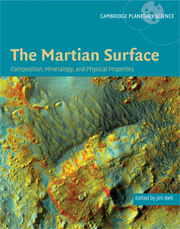Book contents
- Frontmatter
- Contents
- List of contributors
- Foreword
- Acknowledgments
- Part I Introduction and historical perspective
- Part II Elemental Composition: Orbital and in situ Surface Measurements
- Part III Mineralogy and Remote Sensing of Rocks, Soil, Dust, and Ices
- Part IV Physical Properties of Surface Materials
- Part V Synthesis
- Part VI Summary, Upcoming Missions, and New Measurement Needs
- Index
- Plate section
Foreword
Published online by Cambridge University Press: 10 December 2009
- Frontmatter
- Contents
- List of contributors
- Foreword
- Acknowledgments
- Part I Introduction and historical perspective
- Part II Elemental Composition: Orbital and in situ Surface Measurements
- Part III Mineralogy and Remote Sensing of Rocks, Soil, Dust, and Ices
- Part IV Physical Properties of Surface Materials
- Part V Synthesis
- Part VI Summary, Upcoming Missions, and New Measurement Needs
- Index
- Plate section
Summary
The concept of a frontier is a commonplace metaphor in the physical sciences, as well as in the history of exploration. Today, one of the most tangible and alluring of all such frontiers is represented by the surface of Mars. This is because of the literally phenomenal scientific progress that has resulted from the intensified robotic exploration of the Red Planet since 1996. In little more than a decade (1996–2007), scientific viewpoints have been altered more profoundly than in the previous 30 + years. Some would describe this radical alteration in thinking as a scientific revolution. A case for this perspective is made in a convincing fashion here in The Martian Surface: Composition, Mineralogy, and Physical Properties, edited by Jim Bell and written by him and 82 other colleagues who study Mars for a living. Indeed, since the dawn of the Space Age, now in its 50th year (1957–2007), thoughts have often drifted to the so-called “Martian frontier,” with an ever-changing and sometimes disappointing scientific appreciation of what it might offer. This book puts the emerging “new Mars” into a modern scientific context on the basis of an ensemble of up-to-date scientific hypotheses and viewpoints. It brings Mars alive and promotes prospects for future scientific exploration that are certain to continue the revolution at hand.
The Mars that scientific exploration has come to witness today is vastly more dynamic and scientifically interesting than that which the Viking missions of the 1970s revealed.
Information
- Type
- Chapter
- Information
- The Martian SurfaceComposition, Mineralogy and Physical Properties, pp. xv - xviPublisher: Cambridge University PressPrint publication year: 2008
